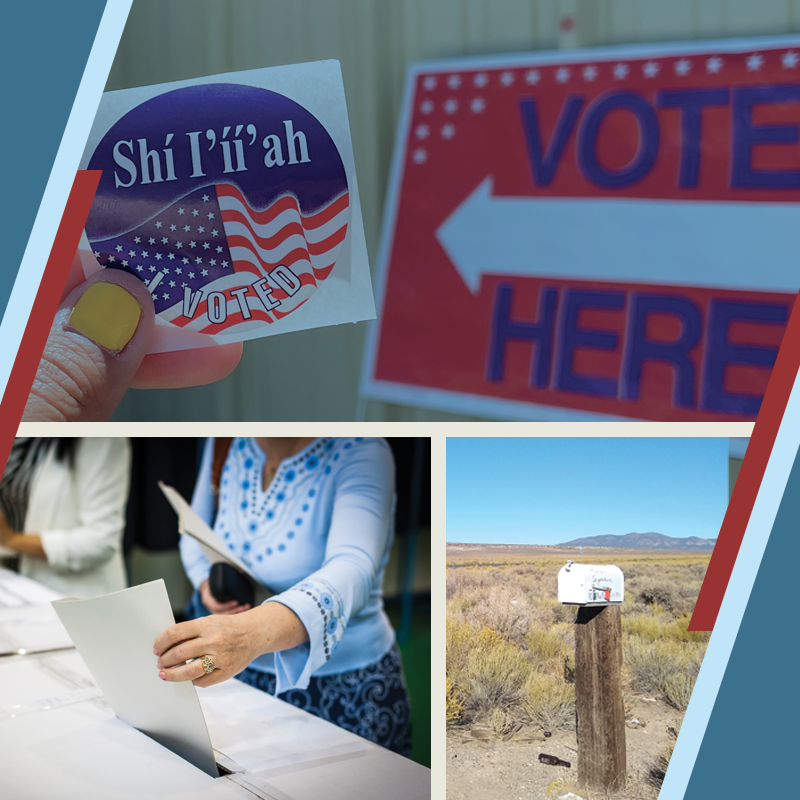
- Details
- By Native News Online Staff
Native Vote. Sixty years ago today, President Lyndon B. Johnson signed the Voting Rights Act of 1965 into law. On this 60th annivesary, the Native American Rights Fund released the following statement and video:
This year marks the 60th anniversary of the Voting Rights Act of 1965 (VRA), a cornerstone of the civil rights movement that aimed to eradicate racial discrimination in voting. Its passage was a monumental achievement, won through decades of organizing, protest, and sacrifice. It promised a future where the right to vote would be equally protected for all.
But today, 60 years later, Native American voters are still fighting to access that promise. Across the country, Native communities continue to face voter suppression, racial discrimination, systemic barriers to the ballot box, and, now, a new and alarming threat to their ability to defend their rights at all.
A clear example of this ongoing discrimination is the case of Turtle Mountain Band of Chippewa Indians v. Michael Howe. In that case, the Turtle Mountain Band of Chippewa Indians, the Spirit Lake Tribe, and individual Native voters challenged North Dakota’s state legislative map under Section 2 of the Voting Rights Act. The plaintiffs argued that the map illegally diluted the voting power of Native people by dividing Tribal communities across districts — thereby denying them an equal opportunity to elect representatives of their choice.
The federal district court agreed. It found that the legislative map violated Section 2 and ordered the state to draw new districts that would fairly represent Native voters.
But then the Eighth Circuit Court of Appeals stepped in with a shocking decision. It ruled that private individuals and groups, like the Tribes and Native voters in this case, do not have the right to bring lawsuits under Section 2 of the Voting Rights Act. According to the court, only the Department of Justice can enforce those protections.
This ruling flies in the face of more than 40 years of legal precedent. Historically, nearly all successful Section 2 cases have been brought by private plaintiffs — not the federal government. If this decision stands, it will leave millions of voters across seven states, including North Dakota, without a meaningful way to challenge racial discrimination in voting.
For Native voters, the consequences are especially severe. Tribes have long relied on Section 2 to fight back against voter suppression that targets their communities. Without access to the courts, Tribal Nations are left with little practical way to defend their political voice.
So, while the Voting Rights Act turns 60 this year, Native communities are still being told to wait. Still being denied equal access. Still being silenced — this time, by a court decision that rewrites the rules and undermines the very protections the VRA was meant to provide.
The Native American Rights Fund and co-counsel the Campaign Legal Center, Law Offices of Bryan L. Sells, LLC, and Robins Kaplan, LLP, have filed a motion to stay the Eighth Circuit’s ruling and plan to seek review from the U.S. Supreme Court. Because democracy cannot function when the people most affected by injustice are barred from seeking justice.
On this 60th anniversary, let’s be clear: The Voting Rights Act is not a relic of the past. It is a living promise, one that must include Native voters. And that promise remains unfulfilled.
More Stories Like This
Native News Weekly (August 25, 2024): D.C. BriefsMonday Morning (March 2, 2026): Articles You May Have Missed This Past Weekend
Native News Weekly (March 1, 2026): D.C. Briefs
Scope Narrowed, Report Withheld: Questions Mount Over Michigan Boarding School Study
Zuni Youth Enrichment Project Announces Family Engagement Night and Spring Break Youth Programming
Help us defend tribal sovereignty.
At Native News Online, our mission is rooted in telling the stories that strengthen sovereignty and uplift Indigenous voices — not just at year’s end, but every single day.
Because of your generosity last year, we were able to keep our reporters on the ground in tribal communities, at national gatherings and in the halls of Congress — covering the issues that matter most to Indian Country: sovereignty, culture, education, health and economic opportunity.
That support sustained us through a tough year in 2025. Now, as we look to the year ahead, we need your help right now to ensure warrior journalism remains strong — reporting that defends tribal sovereignty, amplifies Native truth, and holds power accountable.
 The stakes couldn't be higher. Your support keeps Native voices heard, Native stories told and Native sovereignty defended.
The stakes couldn't be higher. Your support keeps Native voices heard, Native stories told and Native sovereignty defended.
Stand with Warrior Journalism today.
Levi Rickert (Potawatomi), Editor & Publisher


